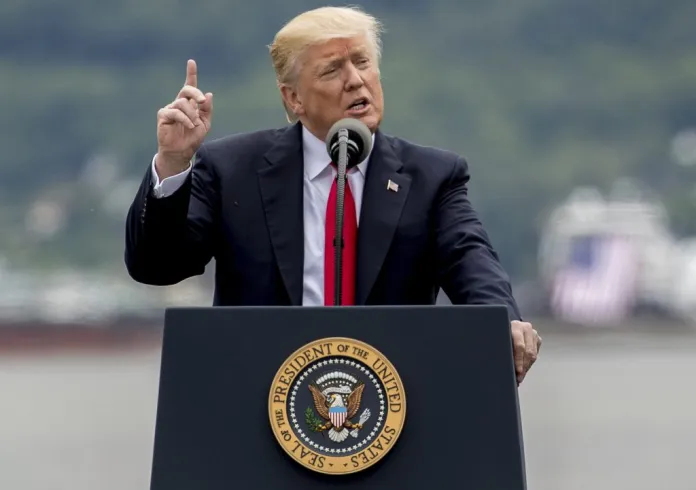Outside Groups Leading Trump GOTV Game May Be A Good Thing
Month indicated a competitive landscape in Pennsylvania, with significant engagement from voters who had previously been less involved in the political process. The success of initiatives like those undertaken by the Sentinel Action Fund and its partners shows a concerted effort to shift the Republican base’s approach to voting, particularly in light of the increased availability of mail-in and absentee voting options.
As the political environment evolves, the utilization of technology-based solutions and grassroots organizing has become more pivotal. This aligns with lessons learned from previous election cycles, where the Democrats often capitalized on these tactics. The goal now is not just about mobilizing the existing voter base but also bringing in those who may have felt disenfranchised or disconnected from the political process.
It’s clear from various testimonials and reports that the Republican National Committee and affiliated PACs are working diligently to bolster their ground game and ensure that they are equipped to compete effectively against Democratic strategies. This includes robust efforts in voter outreach, targeted messaging, and adapting to the realities of early voting and ballot returns.
Ultimately, the combination of grassroots campaigning, innovative technology, and strategic alliances among right-leaning organizations reflects a shift in how the GOP is approaching the upcoming election. The hope is to foster deeper engagement and drive turnout in critical battleground states, setting the stage for a more competitive landscape as Election Day approaches.
With just a few weeks to Election Day and early voting already underway in several states, it’s peak time for the “ground game” that campaigns have spent months preparing. Back in May, on-the-ground Republican operatives voiced concerns to The Federalist that the Republican National Committee’s operations weren’t keeping pace with grassroots in swing states.
Now, as Election Day nears, a narrative has emerged in the corporate media about the Trump campaign’s “paltry” ground game. Despite the grousing by some in the GOP, outside groups, including political action committees like the Sentinel Action Fund, are working to match Democrats at their own game. They are mining data, reaching low-propensity voters, and employing cutting-edge technology to create meaningful connections.
‘Game Changer’
Sentinel recently launched its new Relational Organizing app in Montana, Ohio, and Pennsylvania, according to details sent to The Federalist by the super PAC. The first two states hold the key to Republicans taking back control of the Senate, while the Keystone State is a critical player in former President Donald Trump’s quest for a second term in the White House.
The digital get-out-the-vote tool, brought to life by conservative app developer Numinar, was designed to “build a wide ecosystem of conservative operatives and grassroots Americans dedicated to using Relational Organizing to turn out voters,” according to Sentinel. In tech parlance, the app matches “the personal phone contacts or geolocation” of volunteers with “voters in a target universe” and fires out “pre-scripted messages for texts or canvass surveys.” In the language of non-political operative tech geeks (aka average voters), these relational technologies can connect real people with real people they know and trust — “networks of friends, family, and neighbors” — to get out the vote for Trump and other conservative candidates.
Sentinel for months has been working alongside other conservative political action committees to encourage Republicans to do what many have long loathed: vote early. The new app ups that effort, with targeted messages on the devices of voters. According to Sentinel, the smartphone app “puts YOU in the driver seat of your own GOTV efforts.” The system can:
— “Remind … friends to vote early (either in-person or by mail).”
— See which contacts have “not yet returned their ballot, and text them a reminder.”
— “Pull up a map” of an app user’s neighborhood and “see which neighbors [the volunteer] can help vote.
The idea seems to be, leave no vote behind.
“I think this is a game changer,” said Jessica Anderson, president of the super PAC. “We have people in all battleground states using it, and we’re hoping more people use it.”
The app just recently launched, but Sentinel officials tell me the goal is to sign up a “few thousand users,” especially in swing state Pennsylvania. Developers have finished up beta testing and have made improvements to onboarding to make the app as user-friendly as possible with its launch nationwide, the PAC noted in response to The Federalist’s questions.
The goal would be to have users contact 10 to 30 friends with texts. For this first cycle, helping move 10,000 to 15,000 votes would be considered a success, but a scale the organization expects, Sentinel said.
“At Sentinel Action Fund, we see tools like this as a way to help people get involved in the political process and help reach people in non traditional ways. It’s about turning out voters and also building infrastructure to keep turning out voters,” a PAC official said an email response.
While political operations and activism can be highly territorial to the point of being counterproductive, Sentinel is making the app available to right-wing organizations across the field of play. And they need not go through Sentinel Action Fund to employ it, Anderson said.
“We have to be able to use all of our tools and tactics to get people to vote, including offering our technology,” she told me in an interview last week. “This is one team at the end of the day. If we’re not all doing our part to win, we will keep losing. This is an inflection point.”
Some conservative grassroots organizations seem to have learned some important lessons that only losing can teach. It appears outsourcing ground operations to groups like Sentinel, instead of merely conducting them in-house by the RNC, is part of that learning curve.
Leftist outside groups for years have been doing relational organizational work in GOTV campaigns, filling gaps for Democrat candidates and the party through community organization.
An advisory opinion issued earlier this year by the Federal Election Commission “appears to have opened the door” for outside groups — 501(c)(4)s and super PACs — to coordinate with federal candidates in some GOTV efforts, as the Hill previously noted. The new guidance makes a way for Republican candidates to partner more easily with their allies as the GOP plays catch-up to the Democrat election machine.
‘Hammering on Absentee Ballot Return’
But a recent Politico piece, headlined “Republicans are starting to raise alarms about Trump’s ground game,” paints a less optimistic picture.
The three reporters on the story cite interviews with “more than a dozen Republican strategists and operatives” in battleground states who reportedly complained about a “paltry get-out-the-vote effort by the Trump campaign,” described in the piece as “an untested strategy of leaning on outside groups to help do field work.”
“After years of attempts to mimic Democrats’ Barack Obama-era grassroots organizing model, the GOP is still trying to develop a ground game strategy that can rival their opponents’. And as Harris continues to pour money into her door-to-door efforts, some of the strategists and operatives fear the party’s efforts this year will fall short — potentially hampering Trump in key battlegrounds,” the piece asserts.
But others say outside groups are playing a critical role in realizing the RNC’s new-found appreciation for absentee and early voting, among other ground game initiatives in critical swing states.
Ned Ryun of American Majority Action says the political action committee is expected to have as many as 2,000 people on the ground chasing absentee ballots in Arizona, Nevada, and Wisconsin, with allied groups working in Georgia and Pennsylvania. Ryun, who, according to his bio, launched the 501(c)(3) American Majority in 2008 to train and mobilize conservative candidates and activists, said he had an epiphany after the predicted “red wave” of 2022 failed to materialize. He told donors that conservatives needed to “export” the wildly successful Florida Republican Party’s absentee ballot chase program that reelected Gov. Ron DeSantis by massive margins and turned the Sunshine State from light blue to firetruck red.
Victory came in targeting mid-to-low-propensity voters, people who infrequently vote at best. The Florida GOP, Ryun said, generated Republican votes from these voters at an 80 percent-plus clip. He describes it as a series of “targeted harassments,” reaching voters where they live through door knocks, phone calls, postcards, texts, digital, whatever it takes to remind them to get their ballot in.
The first battle, Ryun and other conservative activists know, is getting Republicans to change their mindset on absentee and early voting, a challenge made all the more difficult by the wariness of a GOP presidential candidate burned in 2020 by the shenanigans surrounding mail-in ballots.
It’s about “[p]laying the game by the rules,” Ryun told me on a recent edition of The Federalist Radio Hour podcast. “So we’re hammering on absentee ballot return the minute they drop, and then the minute early voting starts, we are trying to get people to go out and vote early.” The goal, he added, is not only to get ballots in and prevent waiting for the kind of games played in Maricopa County, Arizona, during the 2022 midterms, but to change the entire narrative.
“The narrative being, I hope, is that Donald Trump is either in the lead or narrowly behind on the [absentee ballot/early voting] vote so that coming into Election Day where traditionally Republicans absolutely annihilate Democrats, Donald Trump crushes on Election Day and wins reelection by winning most of these, if not all, of [the] seven key states,” Ryun said of the battleground states that will likely decide next month’s election.
‘How to Talk MAGA’
Turning Point Action, too, is operating an aggressive get-out-the-vote campaign with its Chase the Vote Initiative, also promoting technology to capture ballots. The Associated Press on Monday reported that it had “obtained an unvarnished look at how Turning Point is promoting its strategy” via recordings of the conservative group’s presentations to “state and local Republican officials.”
The AP piece asserts the Trump campaign’s decision to rely on “untested groups” to chase ballots is drawing criticism from some Republican strategists.
“Their strategy is bad. They know how to talk MAGA, they know how to message the base,” Tyler Montague, a Republican strategist from Arizona and a “longtime Turning Point critic,” reportedly told the accomplice news outlet. “But they literally don’t know what to say to a swing voter. They alienate these people.”
Turning Point spokesman Andrew Kolvet “rebuffed such criticism,” according to the AP. “We did this because we knew conservatives need” a GOTV strategy, he reportedly said.
The Republican National Committee disagrees with the assessments of what one national party leader sees as sour grapes strategists.
“Republican strategists complaining about the ground game are doing so because they are not involved,” an RNC official told me on background.
He praised the efforts of the various players for delivering “the most robust and comprehensive ground game” he’s seen in 15 years.
“Ballot chasing, GOTV phone banking, low propensity voter turnout, election integrity operations. These are significant operations that the grassroots trust because they are a part of them and have seen the program work first hand,” the RNC official said.
‘100 Percent Helpful’
As The Federalist reported earlier this year, the Sentinel Action Fund, the Republican State Leadership Committee PAC, and the Keystone Renewal PAC announced a “historic” 8-figure investment to go after the hearts, minds, and ballots of voters in Pennsylvania. Sentinel in the late spring announced similar charges in Montana and Ohio.
Since the launch of its GOTV initiative in Pennsylvania, Sentinel, the RSLC, and Keystone Renewal report that it is well on its way to meeting its goal to produce “200,000 new Republican vote-by-mail voters,” including first-time ballot casters in November’s election. According to a September press release, the campaign has “added nearly 120,000 voters to the permanent vote-by-mail list — 90,000 of those since the primary election.”
“Beyond the permanent list, nearly 30% of Republican vote-by-mail requests have been submitted by voters who have never voted by mail previously and more than 34% of total Republican requests are coming from low-propensity voters,” the release states. “Republicans in Pennsylvania have already generated more than 350,000 total vote-by-mail requests. To put this in perspective, at this point in 2022, Republicans had only generated around 172,000 vote-by-mail requests.”
A Sentinel Action poll last week found the presidential and Senate races in Pennsylvania are a dead heat.
🚨 New Sentinel Action Fund poll shows Presidential and Senate races are in a dead heat in Pennsylvania.
Republican Dave McCormick is closing in on Senator Bob Casey and increasing our chances of a Republican Senate majority next year. pic.twitter.com/YF0SaNc3Mc
— The Sentinel Action Fund (@sentinelaction) October 3, 2024
Are there turf wars and disconnects in the conservative movement? Absolutely. But Sentinel’s Anderson tells me that, despite the grousing by some strategists, amplified by Trump-hating corporate news outlets, Republicans have tapped into a robust network of outside organizations “committed to working together.”
The RNC official who spoke to The Federalist said the ground game effort has been collaborative from the start.
“That’s why it’s working, that’s why we’re going to win,” he said.
“I think it’s total fake news to say that outside help isn’t helpful. It’s 100 percent helpful. I’m proud to do our small part to support a coalition working on the ground,” Anderson said.
For more election news and updates, visit electionbriefing.com.
Matt Kittle is a senior elections correspondent for The Federalist. An award-winning investigative reporter and 30-year veteran of print, broadcast, and online journalism, Kittle previously served as the executive director of Empower Wisconsin.
" Conservative News Daily does not always share or support the views and opinions expressed here; they are just those of the writer."




